Alfa Romeo Junior vs Hyundai Inster – Which car suits you better?
Both models have their strengths – but which one suits you more?
Compare performance, efficiency, price and space directly: Alfa Romeo Junior or Hyundai Inster?
Costs and Efficiency:
Price and efficiency are key factors when choosing a car – and this is often where the real differences emerge.
Hyundai Inster has a noticeable advantage in terms of price – it starts at 20500 £, while the Alfa Romeo Junior costs 25700 £. That’s a price difference of around 5186 £.
In terms of energy consumption, the advantage goes to the Hyundai Inster: with 14.30 kWh per 100 km, it’s slight more efficient than the Alfa Romeo Junior with 15.10 kWh. That’s a difference of about 0.80 kWh.
As for range, the Alfa Romeo Junior performs hardly perceptible better – achieving up to 410 km, about 40 km more than the Hyundai Inster.
Engine and Performance:
Power, torque and acceleration are the classic benchmarks for car enthusiasts – and here, some clear differences start to show.
When it comes to engine power, the Alfa Romeo Junior has a decisively edge – offering 280 HP compared to 115 HP. That’s roughly 165 HP more horsepower.
In acceleration from 0 to 100 km/h, the Alfa Romeo Junior is clearly quicker – completing the sprint in 5.90 s, while the Hyundai Inster takes 10.60 s. That’s about 4.70 s faster.
In terms of top speed, the Alfa Romeo Junior performs noticeable better – reaching 206 km/h, while the Hyundai Inster tops out at 150 km/h. The difference is around 56 km/h.
There’s also a difference in torque: Alfa Romeo Junior pulls clearly stronger with 345 Nm compared to 147 Nm. That’s about 198 Nm difference.
Space and Everyday Use:
Beyond pure performance, interior space and usability matter most in daily life. This is where you see which car is more practical and versatile.
Seats: Alfa Romeo Junior offers slightly more seating capacity – 5 vs 4.
Both models weigh roughly the same – around 1380 kg.
In terms of boot space, the Alfa Romeo Junior offers distinct more room – 415 L compared to 280 L. That’s a difference of about 135 L.
In maximum load capacity, the Alfa Romeo Junior performs slightly better – up to 1280 L, which is about 221 L more than the Hyundai Inster.
When it comes to payload, Alfa Romeo Junior to a small extent takes the win – 420 kg compared to 357 kg. That’s a difference of about 63 kg.
Who wins the race?
The Alfa Romeo Junior proves to be leaves the rival little chance and therefore becomes our DriveDuel Champion!
Alfa Romeo Junior is the better all-rounder in this comparison.
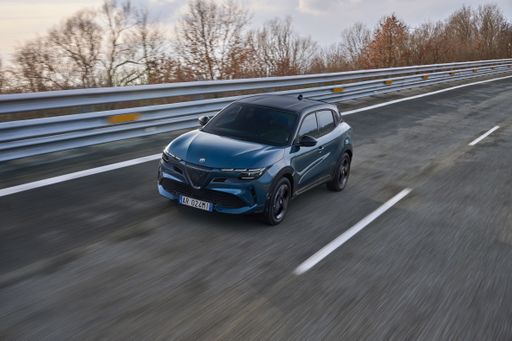 @ Alfa Romeo / Stellantis Media
@ Alfa Romeo / Stellantis Media
Alfa Romeo Junior
Alfa Romeo Junior
The Alfa Romeo Junior captures the essence of Italian design with its sleek lines and compact dimensions, making it an icon of elegance and performance. With a spirited driving experience and a charming retro aesthetic, it appeals to enthusiasts and casual drivers alike. This delightful car embodies the brand's rich heritage while remaining a fun and engaging option for those seeking a unique automotive experience.
details @ Alfa Romeo / Stellantis Media
@ Alfa Romeo / Stellantis Media
 @ Alfa Romeo / Stellantis Media
@ Alfa Romeo / Stellantis Media
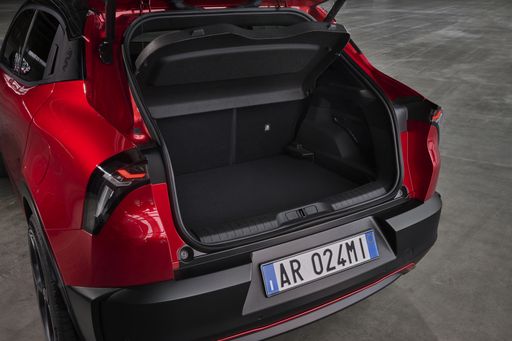 @ Alfa Romeo / Stellantis Media
@ Alfa Romeo / Stellantis Media
Hyundai Inster
The Inster has quickly captured the attention of automotive enthusiasts with its striking design and dynamic performance. This model seamlessly blends advanced technology with comfort, making it an ideal choice for both daily commutes and adventurous road trips. With its spacious interior and innovative features, the Inster promises an exhilarating driving experience that doesn’t compromise on practicality.
details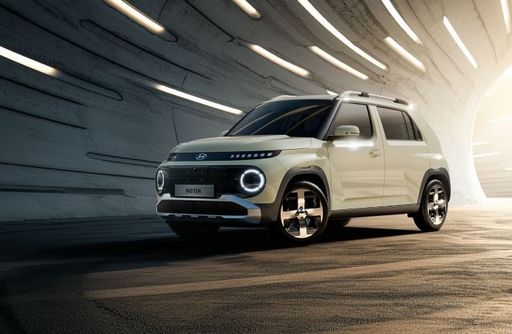 @ Hyundai Motor Company
@ Hyundai Motor Company
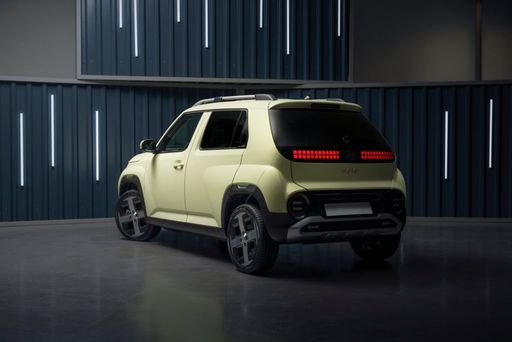 @ Hyundai Motor Company
@ Hyundai Motor Company
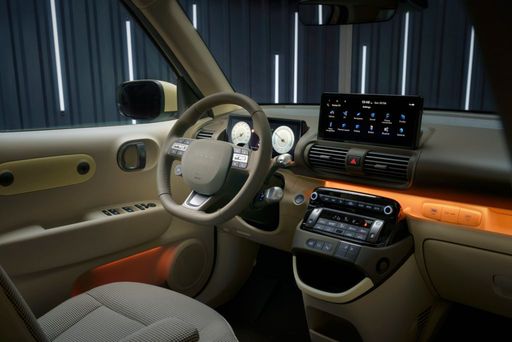 @ Hyundai Motor Company
@ Hyundai Motor Company
 @ Alfa Romeo / Stellantis Media
@ Alfa Romeo / Stellantis Media
|
 @ Hyundai Motor Company
@ Hyundai Motor Company
|
|
|
|
Costs and Consumption |
|
|---|---|
|
Price
25700 - 41600 £
|
Price
20500 - 25800 £
|
|
Consumption L/100km
4.8 - 5.4 L
|
Consumption L/100km
-
|
|
Consumption kWh/100km
15.1 - 17.5 kWh
|
Consumption kWh/100km
14.3 - 15.1 kWh
|
|
Electric Range
344 - 410 km
|
Electric Range
327 - 370 km
|
|
Battery Capacity
0.4 - 51 kWh
|
Battery Capacity
42 - 49 kWh
|
|
co2
0 - 119 g/km
|
co2
0 g/km
|
|
Fuel tank capacity
44 - 45 L
|
Fuel tank capacity
-
|
Dimensions and Body |
|
|---|---|
|
Body Type
SUV
|
Body Type
SUV
|
|
Seats
5
|
Seats
4
|
|
Doors
5
|
Doors
5
|
|
Curb weight
1380 - 1689 kg
|
Curb weight
1380 - 1433 kg
|
|
Trunk capacity
340 - 415 L
|
Trunk capacity
238 - 280 L
|
|
Length
4173 mm
|
Length
3825 - 3845 mm
|
|
Width
1781 mm
|
Width
1610 mm
|
|
Height
1505 - 1538 mm
|
Height
1575 - 1610 mm
|
|
Max trunk capacity
1205 - 1280 L
|
Max trunk capacity
1059 L
|
|
Payload
390 - 420 kg
|
Payload
317 - 357 kg
|
Engine and Performance |
|
|---|---|
|
Engine Type
Electric, Petrol MHEV
|
Engine Type
Electric
|
|
Transmission
Automatic
|
Transmission
Automatic
|
|
Transmission Detail
Dual-Clutch Automatic, Reduction Gearbox
|
Transmission Detail
Reduction Gearbox
|
|
Drive Type
Front-Wheel Drive, All-Wheel Drive
|
Drive Type
Front-Wheel Drive
|
|
Power HP
136 - 280 HP
|
Power HP
97 - 115 HP
|
|
Acceleration 0-100km/h
5.9 - 9.1 s
|
Acceleration 0-100km/h
10.6 - 11.7 s
|
|
Max Speed
150 - 206 km/h
|
Max Speed
140 - 150 km/h
|
|
Torque
230 - 345 Nm
|
Torque
147 Nm
|
|
Number of Cylinders
3
|
Number of Cylinders
-
|
|
Power kW
100 - 207 kW
|
Power kW
71 - 85 kW
|
|
Engine capacity
1199 cm3
|
Engine capacity
-
|
General |
|
|---|---|
|
Model Year
2024 - 2025
|
Model Year
2025
|
|
CO2 Efficiency Class
A, C, D
|
CO2 Efficiency Class
A
|
|
Brand
Alfa Romeo
|
Brand
Hyundai
|
What drive types are available for the Alfa Romeo Junior?
Available configurations include Front-Wheel Drive or All-Wheel Drive.
The prices and data displayed are estimates based on German list prices and may vary by country. This information is not legally binding.
